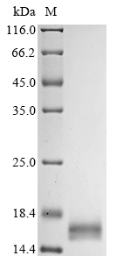Recombinant Mouse Angiogenin (Ang) comes from a yeast expression system and covers the complete mature protein sequence, spanning amino acids 25-145. The protein carries an N-terminal 6xHis tag, which makes purification and detection more straightforward. SDS-PAGE analysis shows purity levels above 90%, which appears adequate for most research purposes. This product is designed strictly for research applications and maintains low endotoxin levels - something that may help ensure more consistent experimental results.
Angiogenin represents a key protein in angiogenesis, the biological process where new blood vessels grow from existing ones. The protein is recognized for its ribonucleolytic activity and seems to play an important role in vascular development and wound healing processes. Scientists also examine angiogenin's involvement in cellular activities like cell proliferation and migration, which makes it an interesting target for cancer and neurological studies.
Potential Applications
Note: The applications listed below are based on what we know about this protein's biological functions, published research, and experience from experts in the field. However, we haven't fully tested all of these applications ourselves yet. We'd recommend running some preliminary tests first to make sure they work for your specific research goals.
Mouse Ang is a ribonuclease that requires precise folding, disulfide bond formation, and proper active site configuration for its enzymatic and angiogenic activities. The yeast expression system provides a eukaryotic environment that supports proper protein folding, disulfide bond formation, and some post-translational modifications, significantly increasing the probability of correct folding compared to prokaryotic systems. The N-terminal 6xHis tag is relatively small and unlikely to significantly interfere with the protein's functional domains. However, experimental validation remains essential to confirm both structural integrity and functional RNase activity.
1. Protein-Protein Interaction Studies Using His-Tag Pull-Down Assays
This application's reliability depends entirely on proper folding validation. Angiogenin interactions with cellular receptors or other proteins require precise tertiary structure. If correctly folded (verified), the protein is suitable for identifying physiological interaction partners in angiogenesis pathways. If misfolded/unverified, there is high risk of non-specific binding or interaction failure, making results biologically misleading.
2. Antibody Development and Validation
Antibody development relies primarily on antigenic sequence recognition rather than functional folding. If correctly folded (verified), the protein excels for generating conformation-sensitive antibodies that recognize native angiogenin epitopes. If misfolded/unverified, it remains highly suitable for producing antibodies against linear epitopes.
3. Comparative Species-Specific Biochemical Analysis
Meaningful comparative studies require native protein conformation and functional activity. If correctly folded and active (verified), the protein enables valid functional comparisons across species. If misfolded/inactive (unverified), comparative analyses would yield misleading evolutionary insights.
4. Protein Stability and Folding Studies
These studies are essential for determining folding status regardless of functional state. If correctly folded (verified), characterization provides reliable data on structural stability and functional requirements. If misfolded/unverified, analysis yields valuable physical property data for this specific preparation.
Final Recommendation & Action Plan
The yeast expression system provides favorable eukaryotic folding conditions for this ribonuclease, but experimental validation of structural integrity and enzymatic activity is essential before reliable use in functional studies. Begin with Application 4 (Protein Stability and Folding Studies) to assess folding quality through techniques like circular dichroism spectroscopy (disulfide bond analysis), size-exclusion chromatography, and validate RNase activity using standard ribonuclease assays. Once correct folding and functional activity are verified, proceed cautiously with Applications 1 and 3 for interaction studies and comparative analyses. Application 2 (antibody development) can proceed immediately regardless of folding status. If misfolding is detected, limit applications to linear epitope antibody production and basic biophysical characterization, avoiding all functional interaction and comparative studies. For reliable angiogenin research, always include appropriate activity controls and consider the protein's RNase function in experimental design.






